Japan's Nikkei Soars After Wall Street Sell-Off
By Rediff Money Desk, New York Aug 06, 2024 09:52
Japan's Nikkei 225 index surged over 10% after a sharp sell-off on Wall Street fueled by concerns about a slowing US economy and rising interest rates. The S&P 500, Dow, and Nasdaq all experienced significant declines.
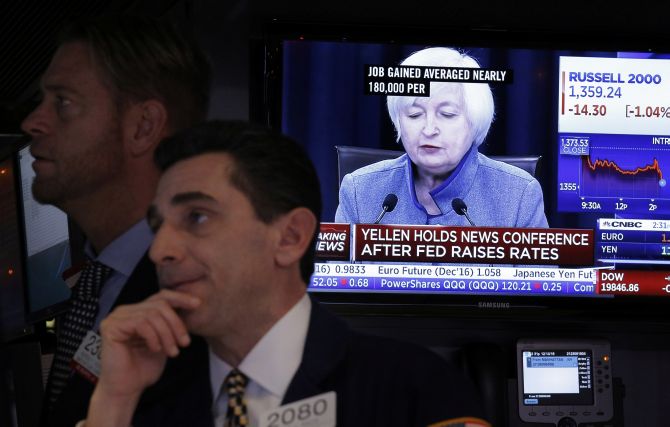
New York, Aug 6 (AP) Japan's benchmark Nikkei 225 index soared more than 10 per cent early Tuesday, a day after it set markets tumbling in Europe and on Wall Street. Other markets in Asia appeared to have settled somewhat after the rollercoaster ride that started the week.
The scary Monday started with a plunge abroad reminiscent of 1987's crash that swept around the world and pummelled Wall Street with more steep losses, as fears worsened about a slowing US economy.
The Nikkei gained nearly 11 per cent early Tuesday but then fell back, trading 8.7 per cent higher at 34,211.83 as investors bought into bargains after the 12.4 per cent rout of the day before.
On Monday, the S&P 500 dropped 3 per cent for its worst day in nearly two years. The Dow Jones Industrial Average reeled by 1,033 points, or 2.6 per cent, while the Nasdaq composite slid 3.4 per cent as Apple, Nvidia and other Big Tech companies that used to be the stars of the stock market continued to wilt.
The drops were the latest in a global sell-off that began last week, and it was the first chance for traders in Tokyo to react to Friday's report showing US employers slowed their hiring last month by much more than economists expected. That was the latest piece of data on the US economy to come in weaker than expected, and it's all raised fear the Federal Reserve has pressed the brakes on the US economy by too much for too long through high interest rates in hopes of stifling inflation.
Professional investors cautioned that some technical factors could be amplifying the action in markets, and that the drops may be overdone, but the losses were still neck-snapping. South Korea's Kospi index careened 8.8 per cent lower, and bitcoin dropped below USD 54,000 from more than USD 61,000 on Friday.
Even gold, which has a reputation for offering safety during tumultuous times, slipped about 1 per cent.
Elsewhere in Asia early Tuesday, Hong Kong's Hang Seng index was up 1.1 per cent at 16,876.98 and the Kospi jumped 3.5 per cent to 2,526.20. Taiwan's Taiex was up 1.2 per cent and in Australia, the S&P/ASX 200 edged 0.3 per cent higher, to 7,675.90.
The Shanghai Composite index, largely bypassed by the drama of the day before, was up 0.2 per cent at 2,865.06.
Monday's meltdowns reflected fears that damage to the economy from prolonged high interest rates has been so severe that the Federal Reserve will have to cut rates in an emergency meeting, before its next scheduled decision on Sept. 18. The yield on the two-year Treasury, which closely tracks expectations for the Fed, briefly sank below 3.70 per cent during the morning from 3.88 per cent late Friday and from 5 per cent in April. It later recovered and pulled back to 3.89 per cent.
The Fed could ride in on a white horse to save the day with a big rate cut, but the case for an inter-meeting cut seems flimsy, said Brian Jacobsen, chief economist at Annex Wealth Management. Those are usually reserved for emergencies, like COVID, and an unemployment rate of 4.3 per cent doesn't really seem like an emergency.
Of course, the US economy is still growing, the US stock market is still up a healthy amount for the year and a recession is far from a certainty. The Fed has been clear about the tightrope it began walking when it started hiking rates sharply in March 2022: Being too aggressive would choke the economy, but going too soft would give inflation more oxygen and hurt everyone.
Some of Wall Street's recent declines may simply be air coming out of a stock market that romped to dozens of all-time highs this year, in part on a frenzy around artificial-intelligence technology. Critics have been saying for a while that the stock market looked expensive after prices rose faster than corporate profits.
Markets tend to move higher like they're climbing stairs, and they go down like they're falling out a window, according to JJ Kinahan, CEO of IG North America. He chalks much of the recent worries to euphoria around AI subsiding, with pressure rising on companies to show how AI is turning into profits, and a market that was ahead of itself.
The only way for stocks to look less expensive is either for prices to fall or for their profits to strengthen. Expectations are still high for the latter, with growth for S&P 500 profits this past quarter looking to be the strongest since 2021.
Professional investors also pointed to the Bank of Japan's move last week to raise its main interest rate from nearly zero. Such a move helps boost the value of the Japanese yen, but it also led traders to scramble out of deals where they borrowed money for virtually no cost in Japan and invested it elsewhere around the world.
Treasury yields also pared their losses Monday after a report said growth for US services businesses was a touch stronger than expected. Growth was led by arts, entertainment and recreation businesses, along with accommodations and food services, according to the Institute for Supply Management.
Still, stocks of companies whose profits are most closely tied to the economy's strength took sharp losses on the fears about a slowdown. The small companies in the Russell 2000 index dropped 3.3 per cent, washing out what had been a revival for it and other beaten-down areas of the market.
Making things worse for Wall Street, Big Tech stocks tumbled as the market's most popular trade for much of this year continued to unravel. Apple, Nvidia and a handful of other Big Tech stocks known as the Magnificent Seven had propelled the S&P 500 to record after record this year, even as high interest rates weighed down much of the rest of the stock market.
But Big Tech's momentum turned last month on worries investors had taken their prices too high and expectations for future growth are becoming too difficult to meet. A set of underwhelming profit reports that began with updates from Tesla and Alphabet added to the pessimism and accelerated the declines.
Apple fell 4.8 per cent Monday after Warren Buffett's Berkshire Hathaway disclosed that it had slashed its ownership stake in the iPhone maker.
Nvidia, the chip company that's become the poster child of Wall Street's AI bonanza, fell even more, 6.4 per cent. Analysts cut their profit forecasts over the weekend for the company after a report from The Information said Nvidia's new AI chip is delayed. The recent selling has trimmed Nvidia's gain for the year to nearly 103 per cent from 170 per cent in the middle of June.
Another Big Tech titan, Alphabet, fell 4.4 per cent after a US judge ruled Google's search engine has been illegally exploiting its dominance to squash competition and stifle innovation.
All told, the S&P 500 fell 160.23 points to 5,186.33. The Dow sank 1,033.99 to 38,703.27, and the Nasdaq composite tumbled 576.08 to 16,200.08.
Worries outside corporate profits, interest rates and the economy are also weighing on the market. The Israel-Hamas war may be worsening, which beyond its human toll could cause sharp swings for the price of oil. That's adding to broader worries about potential hotspots around the world, while upcoming US elections could further scramble things.
Wall Street has been concerned about how policies coming out of November could impact markets, but the sharp swings for stock prices could affect the election itself.
The threat of a recession is likely to put Vice President Kamala Harris on the defensive. But slower growth could also further reduce inflation and force former President Donald Trump to pivot from his current focus on higher prices to outlining ways to revive the economy.
It comes down to jobs, said Quincy Krosby, chief global strategist for LPL Financial. Jobs drive spending by U.S. consumers, which in turn is the biggest part of the US economy.
When we get to election day, the unemployment rate is going to be extremely important. (AP)
The scary Monday started with a plunge abroad reminiscent of 1987's crash that swept around the world and pummelled Wall Street with more steep losses, as fears worsened about a slowing US economy.
The Nikkei gained nearly 11 per cent early Tuesday but then fell back, trading 8.7 per cent higher at 34,211.83 as investors bought into bargains after the 12.4 per cent rout of the day before.
On Monday, the S&P 500 dropped 3 per cent for its worst day in nearly two years. The Dow Jones Industrial Average reeled by 1,033 points, or 2.6 per cent, while the Nasdaq composite slid 3.4 per cent as Apple, Nvidia and other Big Tech companies that used to be the stars of the stock market continued to wilt.
The drops were the latest in a global sell-off that began last week, and it was the first chance for traders in Tokyo to react to Friday's report showing US employers slowed their hiring last month by much more than economists expected. That was the latest piece of data on the US economy to come in weaker than expected, and it's all raised fear the Federal Reserve has pressed the brakes on the US economy by too much for too long through high interest rates in hopes of stifling inflation.
Professional investors cautioned that some technical factors could be amplifying the action in markets, and that the drops may be overdone, but the losses were still neck-snapping. South Korea's Kospi index careened 8.8 per cent lower, and bitcoin dropped below USD 54,000 from more than USD 61,000 on Friday.
Even gold, which has a reputation for offering safety during tumultuous times, slipped about 1 per cent.
Elsewhere in Asia early Tuesday, Hong Kong's Hang Seng index was up 1.1 per cent at 16,876.98 and the Kospi jumped 3.5 per cent to 2,526.20. Taiwan's Taiex was up 1.2 per cent and in Australia, the S&P/ASX 200 edged 0.3 per cent higher, to 7,675.90.
The Shanghai Composite index, largely bypassed by the drama of the day before, was up 0.2 per cent at 2,865.06.
Monday's meltdowns reflected fears that damage to the economy from prolonged high interest rates has been so severe that the Federal Reserve will have to cut rates in an emergency meeting, before its next scheduled decision on Sept. 18. The yield on the two-year Treasury, which closely tracks expectations for the Fed, briefly sank below 3.70 per cent during the morning from 3.88 per cent late Friday and from 5 per cent in April. It later recovered and pulled back to 3.89 per cent.
The Fed could ride in on a white horse to save the day with a big rate cut, but the case for an inter-meeting cut seems flimsy, said Brian Jacobsen, chief economist at Annex Wealth Management. Those are usually reserved for emergencies, like COVID, and an unemployment rate of 4.3 per cent doesn't really seem like an emergency.
Of course, the US economy is still growing, the US stock market is still up a healthy amount for the year and a recession is far from a certainty. The Fed has been clear about the tightrope it began walking when it started hiking rates sharply in March 2022: Being too aggressive would choke the economy, but going too soft would give inflation more oxygen and hurt everyone.
Some of Wall Street's recent declines may simply be air coming out of a stock market that romped to dozens of all-time highs this year, in part on a frenzy around artificial-intelligence technology. Critics have been saying for a while that the stock market looked expensive after prices rose faster than corporate profits.
Markets tend to move higher like they're climbing stairs, and they go down like they're falling out a window, according to JJ Kinahan, CEO of IG North America. He chalks much of the recent worries to euphoria around AI subsiding, with pressure rising on companies to show how AI is turning into profits, and a market that was ahead of itself.
The only way for stocks to look less expensive is either for prices to fall or for their profits to strengthen. Expectations are still high for the latter, with growth for S&P 500 profits this past quarter looking to be the strongest since 2021.
Professional investors also pointed to the Bank of Japan's move last week to raise its main interest rate from nearly zero. Such a move helps boost the value of the Japanese yen, but it also led traders to scramble out of deals where they borrowed money for virtually no cost in Japan and invested it elsewhere around the world.
Treasury yields also pared their losses Monday after a report said growth for US services businesses was a touch stronger than expected. Growth was led by arts, entertainment and recreation businesses, along with accommodations and food services, according to the Institute for Supply Management.
Still, stocks of companies whose profits are most closely tied to the economy's strength took sharp losses on the fears about a slowdown. The small companies in the Russell 2000 index dropped 3.3 per cent, washing out what had been a revival for it and other beaten-down areas of the market.
Making things worse for Wall Street, Big Tech stocks tumbled as the market's most popular trade for much of this year continued to unravel. Apple, Nvidia and a handful of other Big Tech stocks known as the Magnificent Seven had propelled the S&P 500 to record after record this year, even as high interest rates weighed down much of the rest of the stock market.
But Big Tech's momentum turned last month on worries investors had taken their prices too high and expectations for future growth are becoming too difficult to meet. A set of underwhelming profit reports that began with updates from Tesla and Alphabet added to the pessimism and accelerated the declines.
Apple fell 4.8 per cent Monday after Warren Buffett's Berkshire Hathaway disclosed that it had slashed its ownership stake in the iPhone maker.
Nvidia, the chip company that's become the poster child of Wall Street's AI bonanza, fell even more, 6.4 per cent. Analysts cut their profit forecasts over the weekend for the company after a report from The Information said Nvidia's new AI chip is delayed. The recent selling has trimmed Nvidia's gain for the year to nearly 103 per cent from 170 per cent in the middle of June.
Another Big Tech titan, Alphabet, fell 4.4 per cent after a US judge ruled Google's search engine has been illegally exploiting its dominance to squash competition and stifle innovation.
All told, the S&P 500 fell 160.23 points to 5,186.33. The Dow sank 1,033.99 to 38,703.27, and the Nasdaq composite tumbled 576.08 to 16,200.08.
Worries outside corporate profits, interest rates and the economy are also weighing on the market. The Israel-Hamas war may be worsening, which beyond its human toll could cause sharp swings for the price of oil. That's adding to broader worries about potential hotspots around the world, while upcoming US elections could further scramble things.
Wall Street has been concerned about how policies coming out of November could impact markets, but the sharp swings for stock prices could affect the election itself.
The threat of a recession is likely to put Vice President Kamala Harris on the defensive. But slower growth could also further reduce inflation and force former President Donald Trump to pivot from his current focus on higher prices to outlining ways to revive the economy.
It comes down to jobs, said Quincy Krosby, chief global strategist for LPL Financial. Jobs drive spending by U.S. consumers, which in turn is the biggest part of the US economy.
When we get to election day, the unemployment rate is going to be extremely important. (AP)
Source: ASSOCIATED PRESS
Read More On:
DISCLAIMER - This article is from a syndicated feed. The original source is responsible for accuracy, views & content ownership. Views expressed may not reflect those of rediff.com India Limited.
You May Like To Read
TODAY'S MOST TRADED COMPANIES
- Company Name
- Price
- Volume
- GTL Infrastructure
- 2.77 (+ 4.92)
- 36281311
- YES Bank Ltd.
- 23.91 (+ 2.79)
- 15773393
- MTNL
- 65.65 ( -3.20)
- 13464330
- Reliance Power L
- 31.86 (+ 2.08)
- 12854047
- Vodafone Idea L
- 15.69 (+ 3.56)
- 12067225
MORE NEWS

Tata Power & DGPC Partner for 600 MW Hydro...
Tata Power and Druk Green Power Corporation (DGPC) join forces to develop a 600 MW...
L&T Technology Services, Altair Launch Digital...
L&T Technology Services and Altair establish a digital twin center of excellence to...

New Portal for Chinese Technicians in India's...
India launches a new portal to streamline visa processes for Chinese technicians...



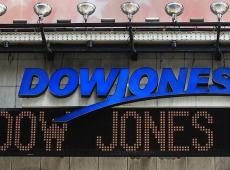
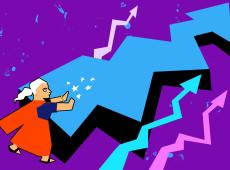
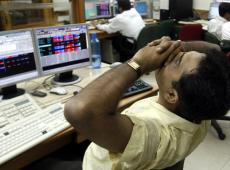
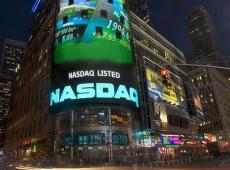
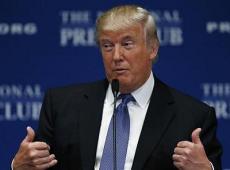
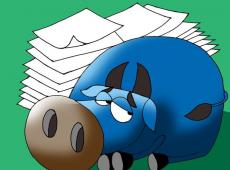
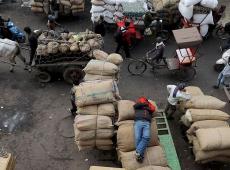
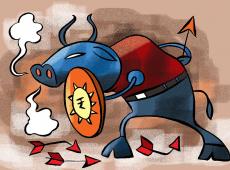
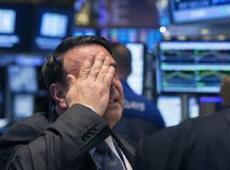
 © 2024 Rediff.com India Limited. All rights reserved.
© 2024 Rediff.com India Limited. All rights reserved.